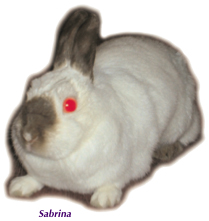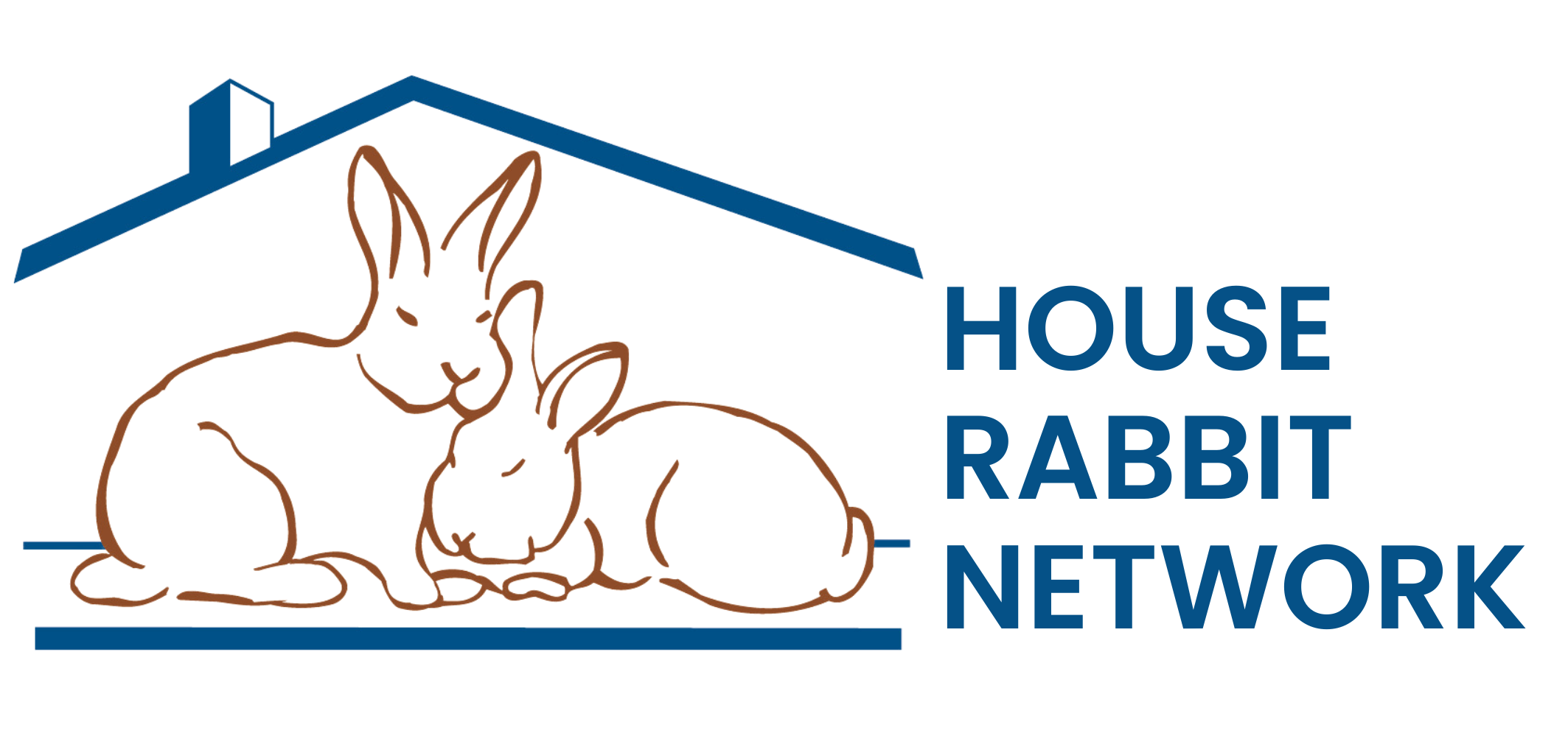Sabrina’s Story

“Ian!” I cry through the phone.
“I think someone switched bunnies on me!”
“Liz,” he whines back. I can tell he is tired of this conversation, but I can’t let it go. I really do believe someone switched my bunny with another. “She’s just a happy bunny!”
I bend down and sneak a peek under the bureau at a white ball of fur with accentuating brown markings. She wriggles her nose, stands, stretches, and darts out into the open space. Halfway across the floor she stops and stares at me before running back to her place under the bureau and grabbing a colorful plastic toy in her mouth. She tosses it, and the sight is too much for me to bear.
“Ian!!!”
“What?”
“She’s playing!”
“See! She’s just a happy bunny.”
And I hope she is.
In February of 2005, I attended my first House Rabbit Network Meeting. I had decided to lend my knowledge of bunnies to an organization looking out for the welfare of rabbits. After I lost my first rabbit, the thought of not participating in the lives and development of rabbits became intolerable, but I knew I wasn’t ready to adopt. I knew I couldn’t, and I knew I wouldn’t. The pain of Seymour’s unexpected death twisted inside me and the idea of taking in another rabbit caused tears to well in my eyes. Even as I pet some of the rabbits in the foster home, I felt my heart breaking.
A month later found me in a basement with Suzanne and Helena, cleaning cages. I was amazed at all the nuances and differences in personalities. I awed at the way each little one responded to tones of voice and pets. Some greedily poked their heads out. Others stood and surveyed from a distance, but the one that caught my attention was the one sitting in her litterbox as I reached in for it. Without a fuss, she hopped out, stood up with her brown ears stretched to attention.
“I don’t remember meeting you last time I was here! You’re so cute!”
Her left ear cocked back as her right ear cocked forward. I stroked that special place between her ears (all bunnies have it!) and simpered as I heard some gentle, purring clicks. I called out to Suzanne and Helena on the other side of the room, “I hear happy noises!”
Helena looks up and says, “That’s great! I remember when Sabrina first came we couldn’t even pet her! She darted back and forth in her cage, ‘Don’t pet me! Don’t pet me!’”
Once the chores had been completed, Helena and I spent some time just being with the bunnies, and compelled by an indefinable urge, I spent most of my time next to Sabrina’s pen. Before I even knew what I was doing, I lifted the little princess out of her confines and held her in the crook of my elbow. Her red eyes stared up at me with a look I had seen before in the children I kept company when volunteering in Maine Medical Center’s children’s ward: “I want to go home. I trust you to get me there.”
But I couldn’t take a bunny home . . . I don’t have a job . . . I don’t have the space . . . I’m barely keeping myself together. It would be nothing short of irresponsible for me to adopt an animal right now — especially one who needs as much attention as this one.
“Hello? May I speak with Suzanne?”
“Hi.”
“I’ve been thinking about Sabrina all day………I’ll take her.”
“Oh, that’s awesome!”
Close to three weeks later (April 27th, in fact) found Sabrina in the kitchen of my small apartment in Somerville. My roommate Tope and her fiancé David sat in the living room while my boyfriend Ian and friend Jeff cut wood, hammered nails, and drilled in screws to loft my bed. I attended an event at Tufts with Suzanne, and when I arrived home several hours later, I had one angry rabbit on my hands. I can’t say I blame her because a long trip that ended in such a chaotic environment would have had me at my wits’ end as well. At the end of the day, Sabrina was in her new pen and took her rightful place as the monster under my bed.
The past seven months has yielded a great many changes. Sabrina and I have learned how to communicate. I have learned that if she jumps at my hand with her paws, I should lower my hands down and ask her what has her so upset. She pauses, looks at my hand, and resorts to a grunt when I remove her water dish. I have learned that she would prefer it if I take off any bracelets when petting her and that if she appears in any way to be aggressive, it is because she is afraid something belonging to her will not come back. But learning these very minute nuances of character and action came over time. The first three months, Sabrina wanted nothing to do with me. She would come out of her pen and tentatively explore the hallway. If I caught her cleaning her face, playing with a toy, eating, drinking, or behaving in any other bunny manner, she would immediately stop what she was doing, and sit quietly, one ear cocked forward, one ear cocked back. I decided the only way this relationship would work is if I inflicted attention on her — a little at a time. I made it a point of petting her once a day, and only once. When she would leap at my arm in anger or defense, I would gaze incredulously at her and say, “I’m not afraid of you, Missy!” I cleaned her pen when she was out exploring, and I purposefully put her toys back in different places so she would have to rearrange her house to her likings again.
For awhile, Sabrina’s aggressive behavior escalated. She knew what belonged to her, and she was bound and determined to protect it at all costs. I didn’t go a day without hearing the livid guttural noises rumbling from her belly and into her nose.
I couldn’t escape a day without a new scratch on my hand. When I would give her treats, she would attack my hand until the treat lay on the ground. But she wouldn’t touch it until I turned away. After several weeks I made a resolution: I would not give up on her. I refused to give her treats if she couldn’t take them nicely. She could paw at my fingers all she wanted, but she would not get the treat until she could learn to take it nicely with her mouth. Around two weeks after I started this method of treat-giving, Sabrina’s grunts decreased in animosity until they almost disappeared. When I sensed that she had given in to my way of handling her, I began to offer her pets as she nibbled on her dried cranberries. The first day or two led to a shocked expression in her bright red eyes, and she made a point of running away as soon as she had swallowed her dessert. A few days more and I could pet her before giving her the treat.
I don’t know what happened to Sabrina that made her so aggressive and angry, but I have some theories. Some of it is just her, and that’s okay. But a good portion of it had to have come from elsewhere. While Sabrina has learned to enjoy a little attention, she will never be a rabbit who enjoys lots of attention. I wonder if her earlier life involved people acquiescing too much to her request to be left alone, resulting in a lack of attention in the end, or if just the opposite — she received too much unwanted attention that she started to repel it. I do not expect to ever fully know which way it was for her, but I do know a quiet persistence was the way to gain her trust.
This last month especially has seen great improvements. Even my roommate, who has two mini-lops of her own, has noticed how Sabrina has become more brave, less aggressive and more responsive to people. Ian, when he visits, remarks how she grunts even less now than she did the last time. It’s true she still wants nothing to do with sitters and will resort to misbehaving when I’m not around (just ask Helena and Shannon!), but would she be a bunny at all if she didn’t? She throws her toys out in the open. She runs into the living room without a second thought to destroy an old chair that I still have only because she enjoys destroying it. She has taken to letting me know when she disapproves of my reading material by sauntering over and pawing at the book. Just three weeks ago while reading Lemony Snicket’s The Penultimate Peril, she took the corner of the book in her mouth and tossed it aside. She’ll poke her face into mine, but when I reach to stroke behind her ears, she’ll turn tail. But she doesn’t mind so much when she’s under the bureau.
We’re still learning about each other, and we still have a ways to go, but mostly, we’re content just to have the other nearby. A lost cause, after all, is still a cause.
by Liz McGovern
